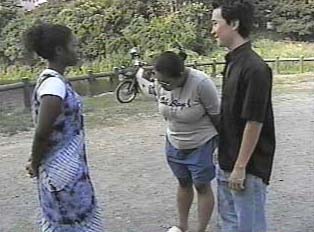LangMedia
Japanese in Japan
Greetings and Partings

Greetings play an important social role in Japanese culture, and most social situations have an appropriate greeting. Visitors should make a point of trying to learn greetings associated with various occasions.
In Japan, it is not customary shake hands, hug, or kiss when greeting or taking leave. Bowing is common, and appropriate particularly when greeting or taking leave of an older person or someone one does not know very well.
The Japanese language has both a polite and an informal form. The polite form is used among adults and by young people when addressing someone older. The informal form is used between young people of the same age.
Videos
-
"Informally Greeting a Friend"Transcript document:
-
"Informally Introducing a Friend"Transcript document:
Audio
Click on the text to hear the spoken phrase.
-
"Hello"
(formal)
こんにちは -
"Hello"
(informal)
よっ! -
"Hello"
(informal)
おっす! -
"Hello"
(for someone you haven't seen for a long time-formal version)
お久しぶりです -
"Hello"
(for someone you haven't seen for a long time-informal version)
久しぶり -
"May I come in?"
(literally, "I will disturb you.)
おじゃまします -
"How are you?"
(informal)
元気? -
"Pleased to meet you."
(formal)
はじめまして -
"departure greeting"
(literally means "I have disturbed you.)
おじゃましました -
"departure greeting"
失礼します -
"It is time for me to go."
ではそろそろ失礼いたします -
"See you again."
(formal)
ではまた -
"See you again."
(informal)
またねー -
"Goodbye"
(formal)
さようなら -
"Goodbye"
(used especially for phone conversations)
失礼します -
"Goodbye"
(used when you are leaving a workplace before other workers)
お先に -
"Goodbye"
(informal)
ばいばい -
"Goodbye"
(informal)
じゃあね
